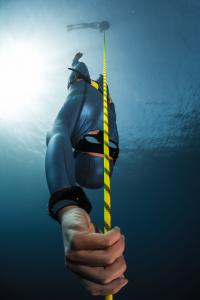Performance Under Pressure: Studying Elite Free Divers with MediPines' AGM100
Pulmonary Consequences of Elite Free-Diving and Translational Research Implications Using MediPines’ Oxygen Deficit Measurement
Published in this month’s Experimental Physiology, the study, entitled, “Temporal changes in pulmonary gas exchange efficiency when breath-hold diving below residual volume,” demonstrated that breath-hold diving to depths associated with major lung compression, or “lung squeeze,” caused acute impairments in pulmonary gas exchange. Prior to this study, scientists did not know the extent of lung injury associated with deep breath-hold diving or the time course of recovery for these breath-hold divers.
Using the MediPines AGM100™, a portable respiratory gas analyzer, researchers field-tested divers’ gas exchange efficiency before and after their deepest dive attempt, and were able to assess the integrated link between hydrostatic-induced lung compression and transient impairments in pulmonary gas exchange efficiency. “We conduct extreme physiology studies to better understand the acute consequences of extreme stress on pulmonary gas exchange. Such work provides novel insight into these unique stresses but also provides application and new insights into a variety of pathological conditions; thus, AGM100 has broad clinical applicability,” said lead researcher Dr. Phil Ainslie, Canada Research Chair and Co-Director of the Centre for Heart lung and Vascular Health, School of Health and Exercise Sciences at the University of British Columbia. These types of studies validate the use of medical instruments in clinical practice for the broader population.
Because the lungs are filled with air, they are susceptible to compression in situations where pressure increases, as in diving. As the divers descend, external pressure is increased, which compresses the lungs. The deeper the divers get, the more lung compression occurs, which results in lung injury that, in some cases, can impair gas exchange for hours following the dive. There are also broader implications of this work to better understand respiratory complications such as pulmonary edema. Swimming-induced pulmonary edema is a common feature in United States Navy Special Warfare training, amongst other sporting and military activities.
This study is the latest in a line of research using the novel MediPines AGM100 to advance respiratory medicine in areas of extreme physiology. The AGM100 is fast becoming a standard tool of global researchers studying the respiratory system in extreme physiological environments due to its precision, comprehensiveness, and portability. The AGM100 is highly correlated with the traditional invasive gas exchange measurements according to leading respiratory physiologists (comparing the ideal PO2 of Riley with end-tidal PO2).
“We are delighted that our technology is proving robust in allowing leading scientists to push the envelope of respiratory science. With experiments in extreme environments such as high altitude and free diving, these scientists are using our device to better understand compromised lung function due to disease processes. This is consistent with our founding mission of advancing respiratory medicine,” said Steve Lee, CEO of MediPines, who co-invented the AGM100™ with world-renowned respiratory physician scientist, Dr. John B. West.
About MediPines AGM100™
MediPines AGM100™ is the world’s first non-invasive gas exchange analyzer. This advanced respiratory monitoring system was designed to rapidly detect respiratory impairment caused by conditions such as COVID-19, chronic obstructive pulmonary disease (COPD), pneumonia, ARDS, pulmonary edema, and pulmonary embolism. The device is FDA cleared and approved for Health Canada COVID-19 Emergency Use. It provides a comprehensive panel of respiratory measurements including blood oxygen levels, Oxygen Deficit (A-a gradient), P/F ratio, and alveolar oxygen and carbon dioxide levels.
About MediPines
MediPines Corporation, based in California, is a market leader in respiratory assessment and monitoring of pulmonary gas exchange. The company mission is to advance respiratory medicine by providing physiology-based respiratory devices that enhance clinical effectiveness and achieve better patient outcomes.
Carissa Drews
MediPines
+1 949-398-4670
email us here
Visit us on social media:
Facebook
Twitter
LinkedIn
Legal Disclaimer:
EIN Presswire provides this news content "as is" without warranty of any kind. We do not accept any responsibility or liability for the accuracy, content, images, videos, licenses, completeness, legality, or reliability of the information contained in this article. If you have any complaints or copyright issues related to this article, kindly contact the author above.


